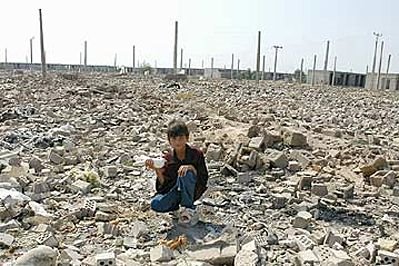Rosebud #270

How can you talk about helping Iraqi refugees without talking about stopping the war?
From refugeesinternational.com:
One in five Iraqis have been displaced.
According to the UN Refugee Agency and the International Organization for Migration in 2007, almost 5 million Iraqis had been displaced by violence in their country, the vast majority of which had fled since 2003. Over 2.4 million vacated their homes for safer areas within Iraq, up to 1.5 million were living in Syria, and over 1 million refugees were inhabiting Jordan, Iran, Egypt, Lebanon, Turkey and Gulf States. Most Iraqis are determined to be resettled to Europe or North America, and few consider return to Iraq an option. Iraqis have no legal work options in most host countries and are increasingly desperate and in need of humanitarian assistance. They face challenges in finding housing, obtaining food, and have trouble accessing host countries’ health and education systems. Their resources depleted, small numbers of Iraqis have returned to Iraq in the past few months, but Iraq’s struggling government recently warned that it can’t accommodate large numbers of returns. Most of those who returned were subsequently displaced again.
The violence in Iraq continues and is indiscriminate.
"Iraqis who are unable to flee the country are now in a queue, waiting their turn to die," is how one Iraqi journalist summarized conditions in Iraq. Refugees International has met with dozens of Iraqis who have fled the violence and sought refuge in neighboring countries. All of them, whether Sunni, Shi’a, Christian or Palestinian, had been directly victimized by armed actors. People are targeted because of religious affiliation, economic status, and profession – many, such as doctors, teachers, and even hairdressers, are viewed as being “anti-Islamic.” All of them fled Iraq because they had genuine and credible fear for their lives and the lives of their loved ones.
Neighboring countries are overwhelmed by the massive influx of Iraqi refugees.
Iraqi refugees are overwhelming the basic infrastructure of Iraq’s neighbors, in particular Jordan, Syria and Lebanon, raising concerns over further destabilization of the region. Jordan, Lebanon and Syria consider Iraqis as “guests” rather than refugees fleeing violence. In October, Syria ended its open-door policy and imposed visa restrictions on Iraqi refugees. In Jordan, where 70 percent of the population is of Palestinian origin, Iraqis have to pay for the most basic services. In Lebanon, Iraqis live as outlaws, hiding from arrest, detention and even deportation. Egypt, the most populous Arab country, hosts 130,000 Iraqis, but has closed its borders to additional Iraqi refugees.
The Government of Iraq is not providing adequate assistance to displaced Iraqis.
The Government of Iraq has finally provided $25 million to Jordan, Syria and Lebanon to help meet the needs of Iraqi refugees in these countries. Yet, despite numerous requests from neighboring countries for more involvement, the Iraqi Government has failed to deliver additional assistance. Instead, the Government has actively encouraged a policy of returns, by asking neighboring countries to close their borders, providing financial incentives to refugee families, and issuing non-exit stamps when refugees return to Iraq. Similarly, the Government of Iraq’s inability to manage the Public Distribution System of food has led millions of displaced Iraqis inside the country to lose the only assistance they were receiving. Despite billions of dollars remaining in its national budget, the Iraqi Government is spending an extremely small amount to assist its internally and externally displaced populations.
UNHCR does not have enough resources to assist Iraqi refugees in the Middle East.
Although the Office of the UN High Commissioner for Refugees received more than $152 million for Iraqi refugees and internally displaced people in 2007, this equals only about $30 per person. The agency needs far more funding to provide adequate protection and assistance to Iraqis, and has requested $261 million for 2008. The agency lacks the resources to process refugees’ documentation adequately. Without staff to monitor borders, UNHCR depends on national governments for updated information on new arrivals. UNHCR is also unable to provide significant assistance to Iraqis, and other UN agencies have been slow to acknowledge the extent of the crisis. The fact that Lebanon, Syria and Jordan are not state parties to the 1951 Refugees Convention further reduces UNHCR’s ability to protect refugees.
The U.S. Continues to Delay Resettlement or Iraqi Refugees
The U.S. fell far short of its promise to permanently resettle 7,000 vulnerable Iraqis in the 2007 fiscal year.
Country of Origin # of Refugees Resettled in FY 2007
Burma 13,896
Somalia 6,969
Iran 5,481
Iraq 1,608
The U.S. promised to resettle 12,000 Iraqis in the 2008 fiscal year, but the program is off to a slow start.
Month # of Iraqis Resettled into US
October 2007 450
November 2007 262
December 2007 245
January 2008 375
February 2008 444
March 2008 751
Policy Recommendations
The United States must begin by acknowledging that violence in Iraq has made civilian life untenable, creating a refugee crisis that is essentially exporting the nation’s instability to neighboring countries. To deal with this crisis, Refugees International recommends the following actions:
1. Given its central role in Iraq, the US should lead an international initiative to support Middle Eastern countries hosting Iraqi civilians and increase direct bilateral assistance to countries hosting Iraqi refugees. Leading the response to the Iraqi refugee crisis should be a focal point of US diplomatic efforts in the Middle East.
2. The US and the UN must work with the Government of Iraq to increase its capacity to respond to the needs of its people. The Iraqi Government’s use of international donors’ funds must be monitored.
3. Donors must continue to increase their support to UNHCR, and other UN agencies must increase their relief efforts for Iraqi refugees.
4. Western countries, including the US, must agree to resettle particularly vulnerable groups, without prejudice to their right to return to their country as recognized under international law.
<< Home